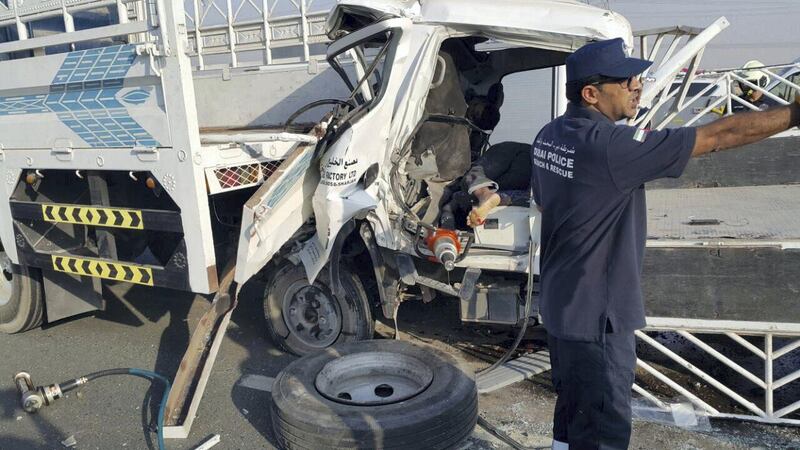The drivers of heavy goods vehicles should be required to work no more than nine hours per day to help cut the number of accidents, road safety experts say.
The dozens of deaths in recent years in accidents involving lorries were on the agenda at an event in Dubai.
Campaigners and officials from Road Safety UAE, Dubai Police and the German lorry company Man heard that some drivers overwork themselves, or are overworked by their employers, to the point they cannot drive safely.
If a driver has not slept in 17 hours, their ability is similar to those driving under the influence of alcohol, one expert said.
In the first 10 months of this year, 12 people died and 82 were injured in 62 accidents involving heavy vehicles, according to Capt Salim Al Jumaie of Dubai Police's traffic department.
Last year, 36 people died and 187 were injured in 99 lorry crashes, and in 2015 the figure was 31 dead and 125 injured.
In 2014, 18 died and 161 were injured in 97 accidents.
"Lorry drivers are often under pressure to continue driving, despite being fatigued. I urge the use of an intelligent application to monitor how long lorry drivers spend on the road without resting", said Thomas Edelmann, founder of Road Safety UAE.
In Germany, for example, lorry drivers must have an electronic control system fitted that monitors the amount of time they spend at the wheel.
They cannot exceed nine hours per day. Twice per week, they can drive for 10 hours. Breaks of at least 45 minutes (divisible into 15 minutes followed by 30 minutes) should be taken after four hours and 30 minutes at the latest.
“The commercial vehicles industry has a vital role to play in improving road safety, said Mr Edelmann.
"There are three important critical issues that must to be considered; including educating fleet operators, the enforcement of laws and regulations that specify the number of hours lorry drivers spend on the road, and to be informed about heavy vehicle maintenance."
In August, Dubai's Roads and Transport Authority said monitoring devices were being installed on articulated lorries that are more than 20 years old as part of efforts to cut the number of accidents.
The RTA has started linking the vehicles to monitoring centres to watch for faults and poor driving behaviour.
“To establish better education for lorry drivers is a good thing, however, it doesn’t solve the problem. There are many old trucks and trailers that are unfit for the roads," said Franz Freiherr von Redwitz, managing director at Man Truck & Bus Middle East.
“When trucks crash, the results are deadly."
He also urged the wider use of electronic chips to monitor behaviour from central control centres.
“A device, which looks much like an ordinary radio, combined with speedometer that records automatically the vehicle’s speed and time spent on the road, will help in keeping tired drivers off the road,” said Mr Redwitz.
Earlier this year, some experts said lorries that are more than 20 years old should be taken out of service.
"Many heavy goods vehicles are death traps," said Robert Hodges, former head of the Emirates Driving Institute, Dubai's largest driving school.
“We seem to have hundreds, perhaps thousands of worn-out and potentially dangerous heavy goods vehicles in daily use. These are too old, usually overloaded or incorrectly loaded."






